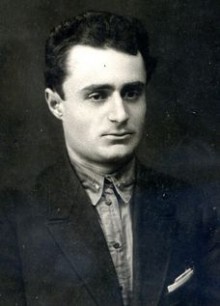Georgis Kostoprav: Difference between revisions
added Category:Russian poets using HotCat |
added Category:Russian journalists using HotCat |
||
| Line 61: | Line 61: | ||
[[Category:1938 deaths]] |
[[Category:1938 deaths]] |
||
[[Category:Russian poets]] |
[[Category:Russian poets]] |
||
[[Category:Russian journalists]] |
|||
Revision as of 22:56, 16 July 2022
Georgis Kostoprav | |
|---|---|
 Georgis Kostoprav | |
| Born | 27 October 1903 O.S. (9 November 1903 N.S.) Maloyanisol, Russian Empire (now South Ukraine) |
| Died | 14 February 1938 (aged 34) Zhdanov (now Mariupol, USSR |
| Occupation | Poet, Journalist, Translator |
| Citizenship | Russian Empire (1903–1917) Soviet Union (1922–1938) |
Georgis Kostoprav (Template:Lang-el; in Soviet spelling Template:Lang-el, Template:Lang-uk, 9 November 1903 – 14 February 1938) was a Rumeika poet, playwright and journalist, who wrote in Mariupol Greek.
Life
Georgis Kostoprav was born in the village Maloyanisol' (then Maly Yanisol') into a family of a scrivener. After two years elementary school in his village he went to Mariupol Realschule.
In 1926-1927 Kostoprav served in the Red Army. In 1927 he worked in Illich Steel and Iron Works as a secretary in the personnel department. In 1932 Kostoprav started to work in Mariupol Greek (Rumeika) newspaper "Kolechtivistis" as an executive editor and journalist. In 1933 he published his first book of poems and in 1934 became a member of the Union of Soviet writers. In 1936 he married Olga Maslakova.
In the night 23/24 December 1937 Kostoprav was arrested in course of so-called Greek operation. 14 February he was sentenced to death and shot the same day. His widow was informed that he died of sarcoma 23 July 1944 (this date was later repeated in his biographies, until the documents on his sentence and execution were published). He was officially rehabilitated in 1957.
Writing
Kostoprav published in 1920s his first poems written in Russian in Mariupol newspapers "Il'ichovets", "Golos truda", "Priazovskii proletarii". In 1930s he published his poems and short stories in Rumeika Greek in local almanacs and magazines "Flogomitres Spithes",[1] "Neotita",[2][3] "Neos Machitis", "Pioneros" and in the newspaper "Kolechtivistis".
In 1933 was published Kostoprav's debut book of poems "The first steps", including his poetry and translations from Russian and Ukrainan poets. In 1934 he published a poem "Leontis Chonagpeis" about a Rumeika folk poet of 19 century.
Kostoprav's play "Autumn leaves" was staged in the Mariupol Greek theatre. He also translated for this theatre multiple plays from Russian.
During his short career Kostoprav also contributed to translations from Russian, including two books of Chekhov's stories,[4][5] poems of Alexander Pushkin[6] and Agniya Barto's poetry for kids.[7] Non-less essential are his translations into Mariupol Greek from Ukrainian poets, Maksym Rylsky, Volodymyr Sosiura and Taras Shevchenko, in particular he translated Shevchenko's "Testament".
He also translated into Russian, among others, a poem of Rumeika poet Vasily Galla "Pirnos".[8] and some samples of Rumeika folklore,[9][10]
Publications
- Ta prota vimata (Τα προτα βιματα, "The first steps"). Preface by F. Iali in Greek and in Russian. Mariupol, 1933.
- Leontis Chonagbeis (Λεοντις Χοναγπεις, "Leontis Chonagbeis"). Mariupol, 1934.
- Kalimera, zisimo (Καλιμερα, ζιςιμο! "Hello, life!"). Stalino, 1937.[11]
Posthumously under the same title were published two books of translations into Russian and Ukrainian:
- Kalimera, zisimo (Калимера, зисимо). Poems in Russian translations /Ed. B. Ya. Shadur, preface by E. Voloshko. Donetsk: "Knizhnoe izdatelstvo", 1963. - 194 p. (2nd ed. 1989., 126 p.)
- Kalimera, zisimo (Калімера, зісімо!). Poems in Ukrainian translations. Dnipropetrovs'k: "Dnipro", 1969.
- G. A. Kostoprav: sochineniia (Г. А. Костоправ: сочинения, "G. A. Kostoprav: works"). Eds. G. A. Animitsa and M. P. Galikbarova. Mariupol, 2012. The book includes Russian, Ukrainian and Rumeika writings of Kostoprav.


Commemoration
- In 1994 in the village Maloyanisol', where Kostoprav was born, was erected his monument and opened a museum. Also in poet's name is named one of the streets in the village.
- In November 2003, on anniversary of Kostoprav's birth, a commemorative plaque was placed on the building, where once has been located the editorial of the Rumeika Greek newspaper "Kolechtivistis" (Miru avenue, 35).[12]
Judging by recent footage from the place, the plaque did not survive the Russian siege of Mariupol in 2022.
References
- ^ Flogomitres Spithes (Φλογομινιτρες ςπιθες). Mariupol, 1933.
- ^ Neotita (Νεοτιτα), 1935, no. 4, p. 35-61.
- ^ Neotita (Νεοτιτα), 1937, no. 5, p. 19-34.
- ^ A. Chekhov. I khoriates (Ι χοριατες, "Peasants"). Mariupol, 1936.
- ^ A. Chekhov. Diigmata (Διιγματα, "Stories"). Mariupol, 1936.
- ^ A. Pushkin. Ergo (Εργο "Works"). Mariupol, 1937
- ^ A. Barto. Astritza pes to opus (Αςτριτζα πες το οπυς "Little stars in the forest"). (2nd ed.) Mariupol, 1937.
- ^ Πιρνος, "Morning": V. Galla. Utro, Literaturnyi Donbass, 1933, no. 7-8, p. 140
- ^ Dosvidan'ia, iunaia podruga (Farwell, young girl-friend), Literaturnyi Donbass, 1936, no. 3, p. 99.
- ^ Skazka o bednom starike i ego petukhe (A tale about a poor old man and his rooster), Literaturnyi Donbass, 1936, no. 3, p. 100-101
- ^ Stefan Kaloerov. Greki Priazov'ia: annotirovannyi bibliograficheskii ukazatel'. Donetsk: "Iugo-Vostok", 1997. P. 141.
- ^ "Мариуполь Советский. 1917–1941 годы". Archived from the original on 28 September 2020. Retrieved 2 June 2010.
{{cite web}}:|archive-date=/|archive-url=timestamp mismatch; 28 October 2020 suggested (help)
